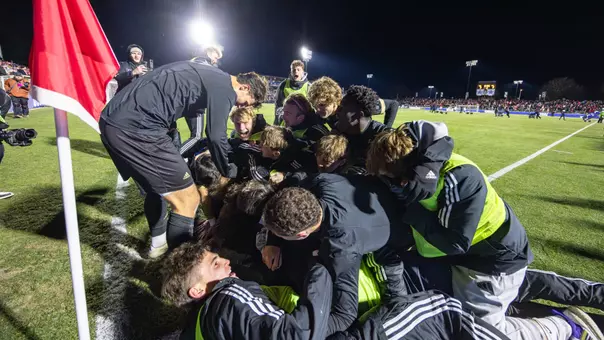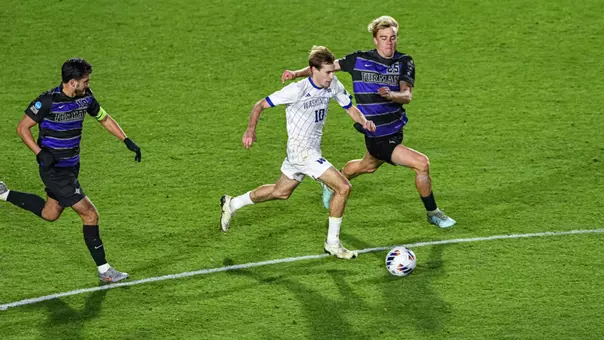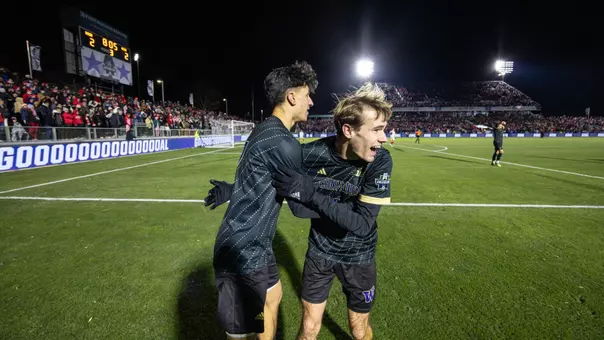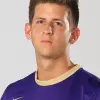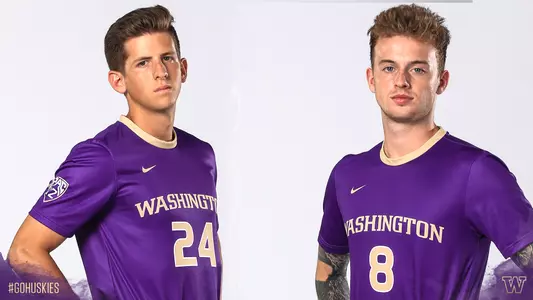
Making the Journey To Montlake
October 23, 2018 | Men's Soccer
by Nick Reeves
Being a student-athlete can be challenging, balancing the rigors of academics at a prestigious university and practice time as well as travel. Then add in another layer of being in a new country or even learning a brand new language on top of that. James Smith and Daniel Ribas on the Husky men's soccer team can attest to the benefits of being an international student-athlete.
Smith a sophomore from Oxford, England and Ribas a junior from Guayaquil, Ecuador are the two lone international players on the team.
While soccer in the United States is growing at a rapid pace, it still does not compare to the soccer culture that Smith and Ribas grew up in.
"Soccer is our main sport," said Smith who has appeared in seven matches this season while recording a goal at Oregon State. "If you go to a school playground where I'm from literally every person will be playing soccer. There are a lot more grass root teams. Growing up I played in an A league that had twenty teams and it went all the way down to the D league which had twenty teams as well. Every day I would go out and play more into the evening, and always be constantly playing."
"Back home soccer is the main sport," said Ribas who has played in 11 matches this season. "Playing soccer was the way to make friends and to be involved."
The transition for both players to the style of soccer in the United State has also been a learning curve as well as learning to play with teammates who grew up playing the same game but a different brand.
"When I first came here (to the United States) I was so skinny," said Ribas who transferred from Creighton before this season. "I struggled a lot. I had to go to the gym my first two years a lot. Now, I'm better able to play with those guys because I know I've grown inside and outside. The game is much more physical."
Smith believes that not only is the play different from his native England but he has had to adjust in ways that one wouldn't expect such as better understand how American referees officiate the games.
"I think England is as physical to the US. I've had to adjust to how the referees call the games," said Smith. "In England you can get stuck into more tackles and get away with more. Where I'm from, it's more technical."
Over the last decade, men's college soccer has become a much more international game as more potential student-athletes see the benefits of playing soccer in the US while also receiving an education.
"At my last club there were people older than me who came out here, and I spoke to them about it and they said it was really fun," said Smith on the decision to play soccer in the US. "Two other people from my team moved out here and we went through the whole process together. It's starting to become a lot more common, before it was really unheard of. With the facilities and the opportunity to get an education, it's an eye opener for many people."
Ribas appreciates what the US has to offer in terms of developing players as well as the high-quality atmospheres in which the Huskies play.
"I think a lot of international players see the US as a place to study as well as having the opportunity to play professionally after four years of college. Especially with the MLS growing so fast. Compared to the US facility wise, Ecuador was way different. We didn't have these nice stadiums to play in and nice grass to play on. I think that helped though because growing up playing in not the best places, that's how you develop your technique. Now playing in sick facilities you can really develop and show what you're capable of."
While there are many aspects of playing soccer in the United States that appeals to international players, there is always the issue of being away from home, friends and family that many college students can relate to.
"The biggest adjustment for me was the time zone," said Smith. "Being able to FaceTime my dad when anything goes wrong, he's normally asleep. Also, school in general. I found it hard to adjust because I was out of school for some time. I had to focus on that aspect as well."
Ribas' biggest challenge was not only coming to a new country but learning a completely new language and being able to communicate with teammates.
"For me it was language, English is my second language. It was difficult to get used to it. It took me a while but it's much better now. Food wise its different, I miss it a lot. It's good here too, I don't mind it. The weather is the biggest difference for me. It's always hot back home and here it's a little cold."
For Smith and Ribas they are both keeping a positive mindset as the Huskies are nearing the end of the regular season.
"I think we've been playing well," said Smith. "I'm trying to stay positive and wait for my time, and when I do just trying to impact the game. Always trying to improve every single day."
Look for James Smith and Daniel Ribas to continue to impact the Huskies this season and for years to come.
Being a student-athlete can be challenging, balancing the rigors of academics at a prestigious university and practice time as well as travel. Then add in another layer of being in a new country or even learning a brand new language on top of that. James Smith and Daniel Ribas on the Husky men's soccer team can attest to the benefits of being an international student-athlete.
Smith a sophomore from Oxford, England and Ribas a junior from Guayaquil, Ecuador are the two lone international players on the team.
While soccer in the United States is growing at a rapid pace, it still does not compare to the soccer culture that Smith and Ribas grew up in.
"Soccer is our main sport," said Smith who has appeared in seven matches this season while recording a goal at Oregon State. "If you go to a school playground where I'm from literally every person will be playing soccer. There are a lot more grass root teams. Growing up I played in an A league that had twenty teams and it went all the way down to the D league which had twenty teams as well. Every day I would go out and play more into the evening, and always be constantly playing."
"Back home soccer is the main sport," said Ribas who has played in 11 matches this season. "Playing soccer was the way to make friends and to be involved."
The transition for both players to the style of soccer in the United State has also been a learning curve as well as learning to play with teammates who grew up playing the same game but a different brand.
"When I first came here (to the United States) I was so skinny," said Ribas who transferred from Creighton before this season. "I struggled a lot. I had to go to the gym my first two years a lot. Now, I'm better able to play with those guys because I know I've grown inside and outside. The game is much more physical."
Smith believes that not only is the play different from his native England but he has had to adjust in ways that one wouldn't expect such as better understand how American referees officiate the games.
"I think England is as physical to the US. I've had to adjust to how the referees call the games," said Smith. "In England you can get stuck into more tackles and get away with more. Where I'm from, it's more technical."
Over the last decade, men's college soccer has become a much more international game as more potential student-athletes see the benefits of playing soccer in the US while also receiving an education.
"At my last club there were people older than me who came out here, and I spoke to them about it and they said it was really fun," said Smith on the decision to play soccer in the US. "Two other people from my team moved out here and we went through the whole process together. It's starting to become a lot more common, before it was really unheard of. With the facilities and the opportunity to get an education, it's an eye opener for many people."
Ribas appreciates what the US has to offer in terms of developing players as well as the high-quality atmospheres in which the Huskies play.
"I think a lot of international players see the US as a place to study as well as having the opportunity to play professionally after four years of college. Especially with the MLS growing so fast. Compared to the US facility wise, Ecuador was way different. We didn't have these nice stadiums to play in and nice grass to play on. I think that helped though because growing up playing in not the best places, that's how you develop your technique. Now playing in sick facilities you can really develop and show what you're capable of."
While there are many aspects of playing soccer in the United States that appeals to international players, there is always the issue of being away from home, friends and family that many college students can relate to.
"The biggest adjustment for me was the time zone," said Smith. "Being able to FaceTime my dad when anything goes wrong, he's normally asleep. Also, school in general. I found it hard to adjust because I was out of school for some time. I had to focus on that aspect as well."
Ribas' biggest challenge was not only coming to a new country but learning a completely new language and being able to communicate with teammates.
"For me it was language, English is my second language. It was difficult to get used to it. It took me a while but it's much better now. Food wise its different, I miss it a lot. It's good here too, I don't mind it. The weather is the biggest difference for me. It's always hot back home and here it's a little cold."
For Smith and Ribas they are both keeping a positive mindset as the Huskies are nearing the end of the regular season.
"I think we've been playing well," said Smith. "I'm trying to stay positive and wait for my time, and when I do just trying to impact the game. Always trying to improve every single day."
Look for James Smith and Daniel Ribas to continue to impact the Huskies this season and for years to come.
Players Mentioned
Charlie Kosakoff NCAA Highlights: Washington Men's Soccer
Thursday, December 18
Connor Lofy NCAA Highlights: Washington Men's Soccer
Wednesday, December 17
Zach Ramsey NCAA Highlights: Washington Men's Soccer
Wednesday, December 17
Joe Dale NCAA Highlights: Washington Men's Soccer
Wednesday, December 17

